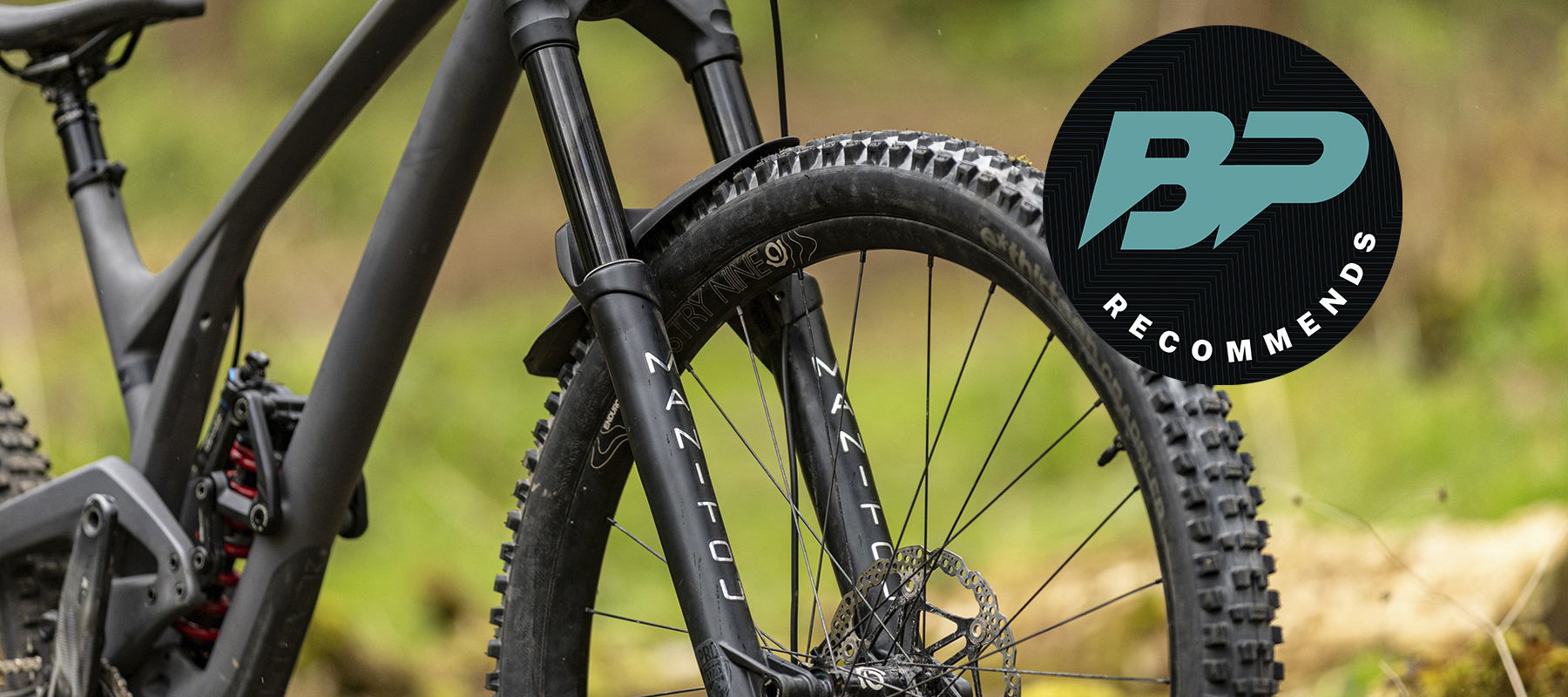Bike Perfect Verdict
Manitou’s Mezzer is a wolf in sheep’s clothing with a smooth and composed touch, excellent tuneability and a class-leading weight.
Pros
- +
Lightweight in its class
- +
Easy internal travel adjustment with spacers
- +
Supple and grippy with loads of traction
- +
Seamless directional changes and loads of support without harshness
- +
Highly tuneable air spring allows setup to delicately balance suppleness and support
Cons
- -
Not as solid and stiff feeling as some 38mm enduro forks
- -
Mudguard is flimsy and it’s harder to use third-party options without tinkering
- -
Fewer damping adjustment clicks and no high-speed rebound adjustment
- -
More complicated to set up and requires precise air pressures
Why trust BikePerfect
Manitou is probably in the top five largest bicycle fork and shock manufacturers in the world. But like many other brands, it barely gets a look in when it comes to OE (the stock kit that your complete bike comes with), which is dominated by Fox and RockShox.
This is partly because the buying public has learned (been programmed?) to trust the two major players as having superior products and, to be fair, why wouldn’t they? Fox and RockShox have earned success by making great kit and their big R&D budgets and economies of scale presumably mean offering great value to bike brands buying high unit numbers.
Just a few years ago, buyers used to regularly see Suntour, Marzocchi, DVO, Formula, Öhlins, DT Swiss, X-Fusion and others on complete bikes in shops, but it’s getting ever harder for smaller brands to make an impact. Modern mountain biking is now about as ruthless a capitalist endeavor as any other large-scale consumer market, so I reckon a suspension manufacturer has only a couple of realistic options to stand out and make some noise.
Smaller brands better deliver something special (hint, hint) or make a boutique or unique product (think Push or EXT) that at least matches the performance of rivals, or, better still, trumps it. And, for a brand like Manitou, the price should sweeten the deal for product managers and the public to overcome the brand perception advantage of the big two. Until one or more of these things happen, the current dynamic isn’t changing any time soon, which must be a tough gig for marketing teams and engineers at relatively smaller suspension firms.
So how does Manitou’s Mezzer fit into this narrative? Well, Manitou is part of the bigger Hayes (brakes) group, so presumably has more engineering and innovation budget and clout than some, and it’s also done a really great job here with damping and air spring that are a match for the very best products in many ways. On top of that, some Mezzer features like the Hexlock SL2 axle and Reverse Arch design (that allows Manitou to claim this as the stiffest enduro fork around and has just been adopted by Fox on its latest 32mm Step-Cast XC forks) are also pretty unique.
The listed price isn’t particularly cheap though (in this more tuneable Pro version at least), but there are some killer deals around online. The fact Mezzer stanchions are 37mm, rather than 38mm, and that funky Reverse Arch might make bigger-is-better enduro and e-bike buyers hesitate too. Overall, though, the Mezzer Pro is still a great option among the best mountain bike forks, so let’s take a deeper dive under the Mezzer skin into the tech and performance and see what makes Manitou’s distinctive product tick.
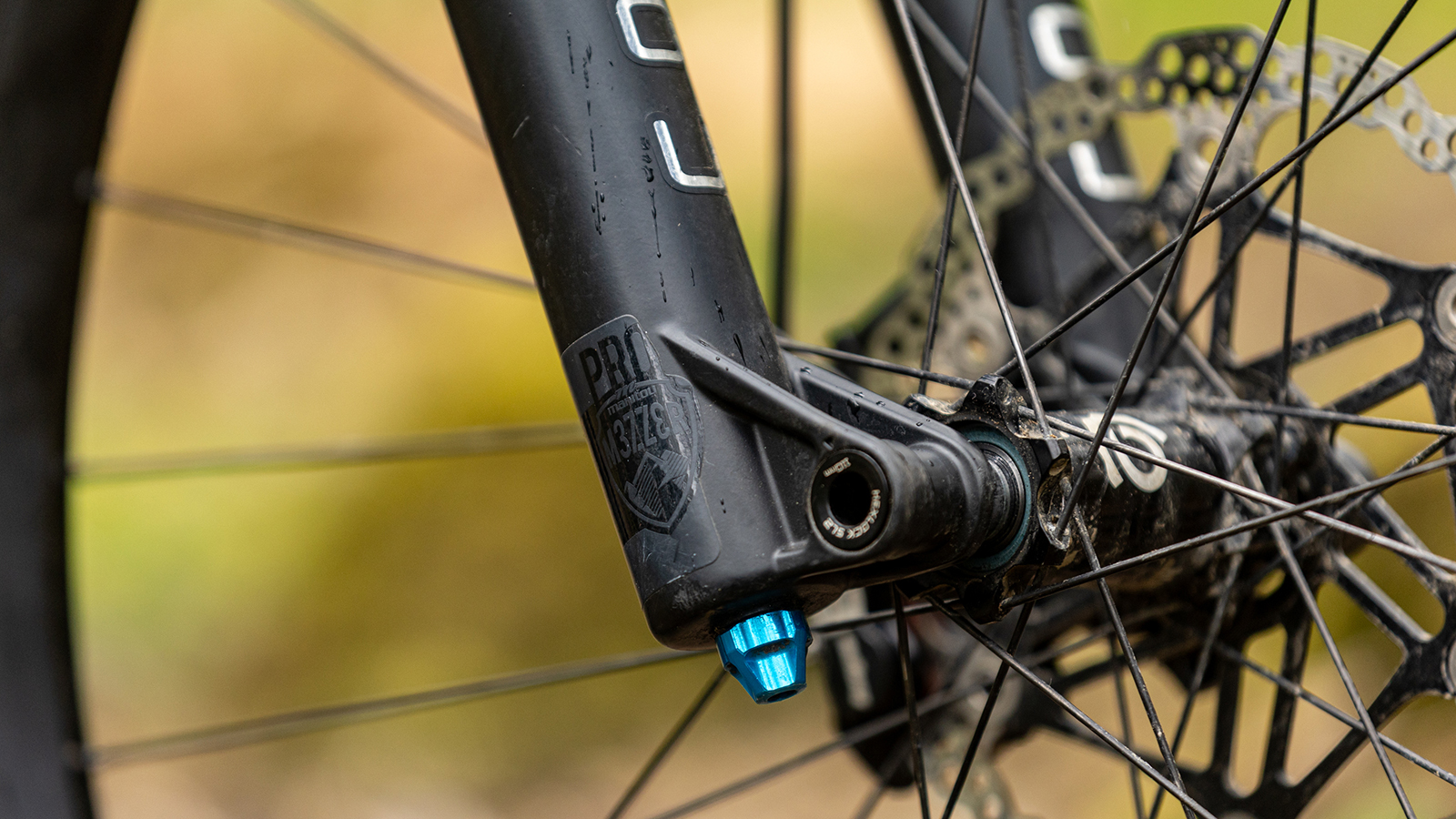
Design and specifications
Two Mezzer models include a cheaper Expert with a less complex air spring and cheaper damper, and this Pro model. Both share 37mm stanchions and a chassis which means the rear reinforcing arch joining the lowers can sit closer to the tire (therefore lower down) for extra stiffness.
Manitou claims that, together with its untwistable Hexlock axle connecting both lower legs, this makes for "the stiffest enduro fork on the market" but doesn’t back these claims up with any metrics and whether that is fore and aft or lateral stiffness on its website.
The Mezzer is adjustable between 140 and 180mm travel via included spacers that offer 10mm (travel and ride height) increments and is also available in both 27.5in and 29in sizes in three different offsets (37, 44 and 51mm). The fork is packed with features on both the damper and air spring side, yet at 2,010g, it still has one of the lowest weights in its category.
This Pro version has the Dorado air spring developed in the brand’s well-regarded upside-down downhill forks. In effect, it’s similar to Öhlins' forks in having three chambers – a positive spring to support rider weight, a negative spring to push the fork into its travel and an IRT ‘volume adjuster’ spring that is a more tuneable dynamic version of bottomless tokens or spacers in rival products.
Positive and negative chambers are self-balancing and Manitou’s design uses maximum internal space inside the leg for a larger air spring volume, whereas the Swedish firm seals its air spring assembly independently inside the leg in a cartridge. By altering the balance between the IRT (Infinite Rate Tune) chamber and the ‘main’ spring(s) you can control mid-stroke support and bottom-out independently of the ‘initial’ spring rate to independently tune small bump sensitivity and performance deeper in the travel.
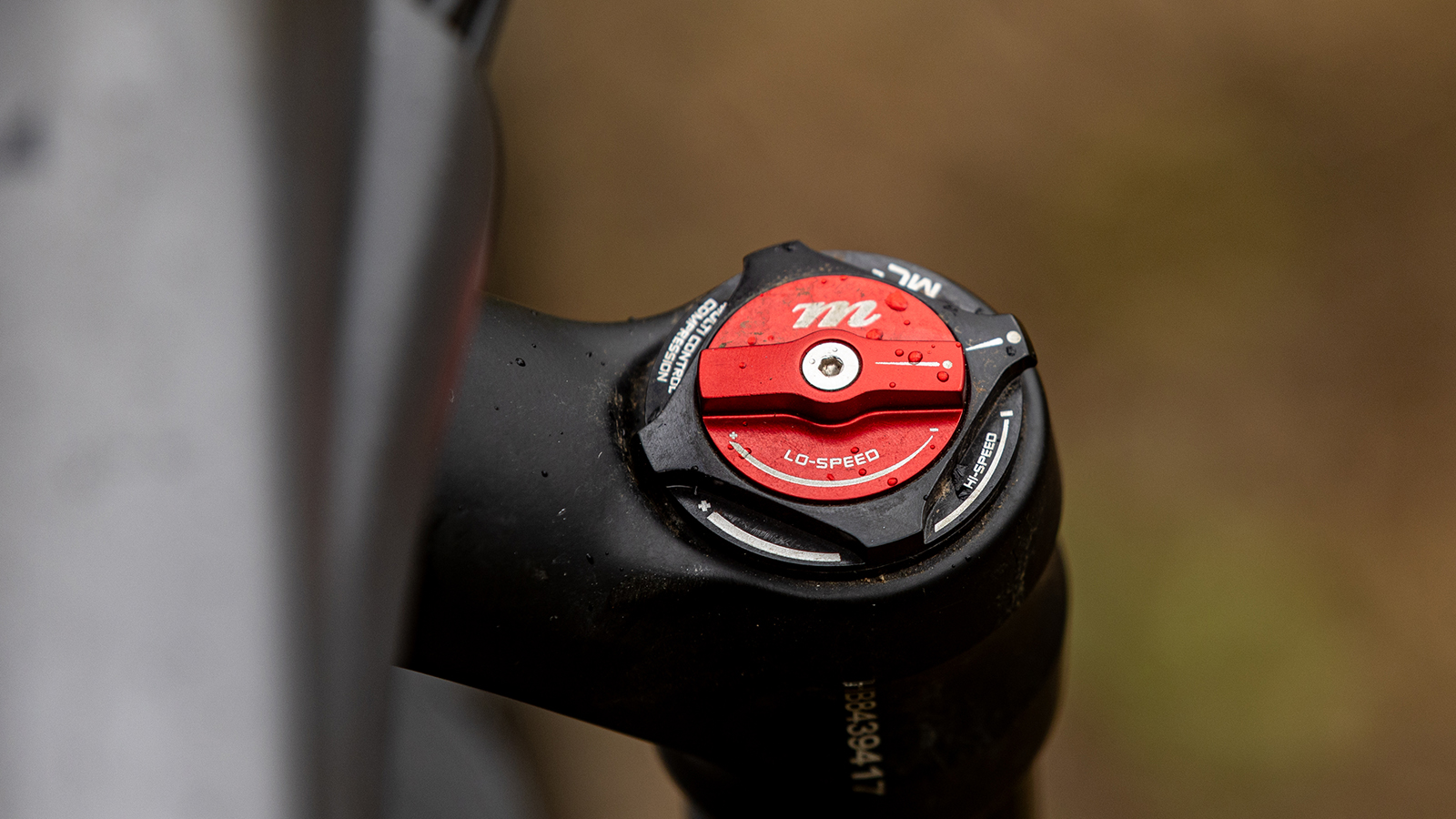
Manitou’s MC2 damper is a fully-sealed bladder design with separate blow off thresholds and low and high-speed damping adjustment. The rubber bladder can compress and expand as damper fluid is pushed back and forth by the shaft and works more like RockShox’s Charger 2 (and also requires fewer dynamic seals) than its latest Charger 3 – which uses a pressure-backed internal floating piston. MC2 is over four years old but also has its own internal hydraulic bottom-out control, which is more like latest generation RockShox rear dampers. High and low-speed rebound damping aren’t independently adjustable unlike Fox’s Grip 2 or brand-new Grip X setup though.
Being 1mm narrower than most enduro forks should, in theory, reduce sliding friction while telescoping and the 37mm legs also slide on low-friction SKF seals to ensure smooth movement. These inner legs use stronger 7000-series aluminum that’s butted throughout to save grams and are pressed into a hollow crown that has extra overlap over the stanchions for stiffness and is also cold forged for extra strength.
Manitou’s Reverse Arch makes cable hose routing slightly different to most forks, but it’s neat enough and the arch also neatly houses a bendy plastic fender that comes with the fork. This mudguard is a bit measly for proper wet winter riding though and the Mezzer design makes it harder to fit a full-length mudguard from established brands without DIY-ing some holes and doing a bodge job that might not be quite as elegant as a fork-specific design.
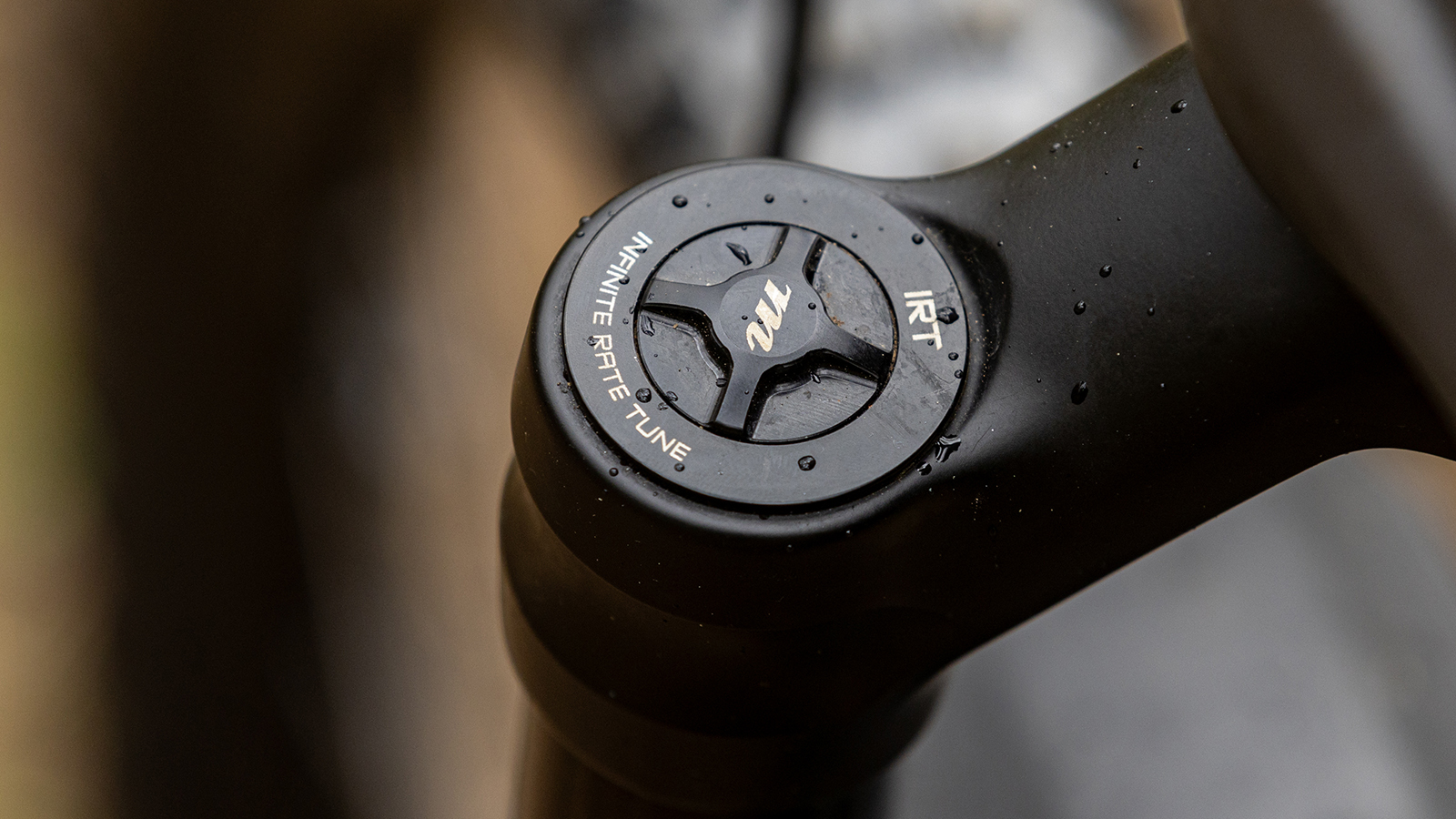
Performance
I first rode Manitou’s Mezzer Pro back on its launch in 2019 and while it really impressed, for one reason or another, I didn’t have much more to do with it until last summer. Then, out in the Alps with plenty of time to experiment, my hammered RockShox Zeb in need of a lower leg service and the latest Mezzer Pro sat in a box, it was a no brainer to give it another go.
Manitou’s fork takes some more detailed setting up than the basic RockShox pump, twiddle and go that will definitely suit some people more, but this also provides more scope to tune exactly how the air spring supports rider weight and absorbs bumps. There is a good video from Hayes explaining how the air spring architecture works, how adding more or less air to the ‘main’ positive chamber and the IRT chamber has a big effect on how support changes through the stroke, and how you can dial in beginning, middle and end stroke/bottom-out zones independently.
The three-way damper setup is pretty self-explanatory, but one thing that’s neat is that, unlike most rivals’ forks, at 85kg I found myself in the middle of the Mezzer range – where I should be, rather than at lighter extremes of damping chasing comfort and suppleness. I ran rebound slightly more open than mid and high-speed compression two clicks in from open – some tweakers might appreciate more than the four high speed compression options as you can clearly feel the effect of each click on the trail.
Considering I was totally dialed in on my bike after days of non-stop riding, I wasn’t sure exactly what to expect comparing directly with a Zeb. From the first trail, it’s obvious there is a very different feel with the Mezzer and it’s also pretty clear this isn’t the stiffest enduro fork on the market as the brand claims. For my money, the Zeb is noticeably more solid and direct steering and leaning the bike, and it also slams straight through the rough stuff without ever deflecting. That’s not to say Manitou’s fork is any kind of noodle – it’s more than stiff enough to feel and steer precisely, but just a little closer to a Lyrik/36 than the two big brands’ 38mm stanchioned big hitters.
On this topic, while it’s subjective, my sense is that any flex is more fore and aft than torsional, which keeps the steering true, but it just doesn’t quite feel as rock-solid as a Zeb pummelling through rough stuff and I guess this isn’t that surprising when the Mezzer is 275g lighter than a Zeb and almost 300g lighter than a Fox 38 (that’s well over half a pound).
It's not just the chassis that feels different either though; Manitou’s damping and air spring characteristic serve up a different flavor too. Mezzer is silky and fluid and almost a match for RockShox in terms of pebble-tracing or tracking bumpy ripples and chattery surfaces (where RS is widely regarded as one of the best) and comfortable on your hands and arms. I also really like how you can have a very smooth supportive mid-stroke without losing too much off-the-top pitter-patter response like a (bedded in) Zeb is so good at.
The Mezzer also gives you the extra option to tune support on-the-fly with a shock pump – whether you’d like a bit more to push and pump against in Alpine bike park-type trails with big jumps and berms, or a floatier, traction-rich feel for blind trials or steeper slower tech.
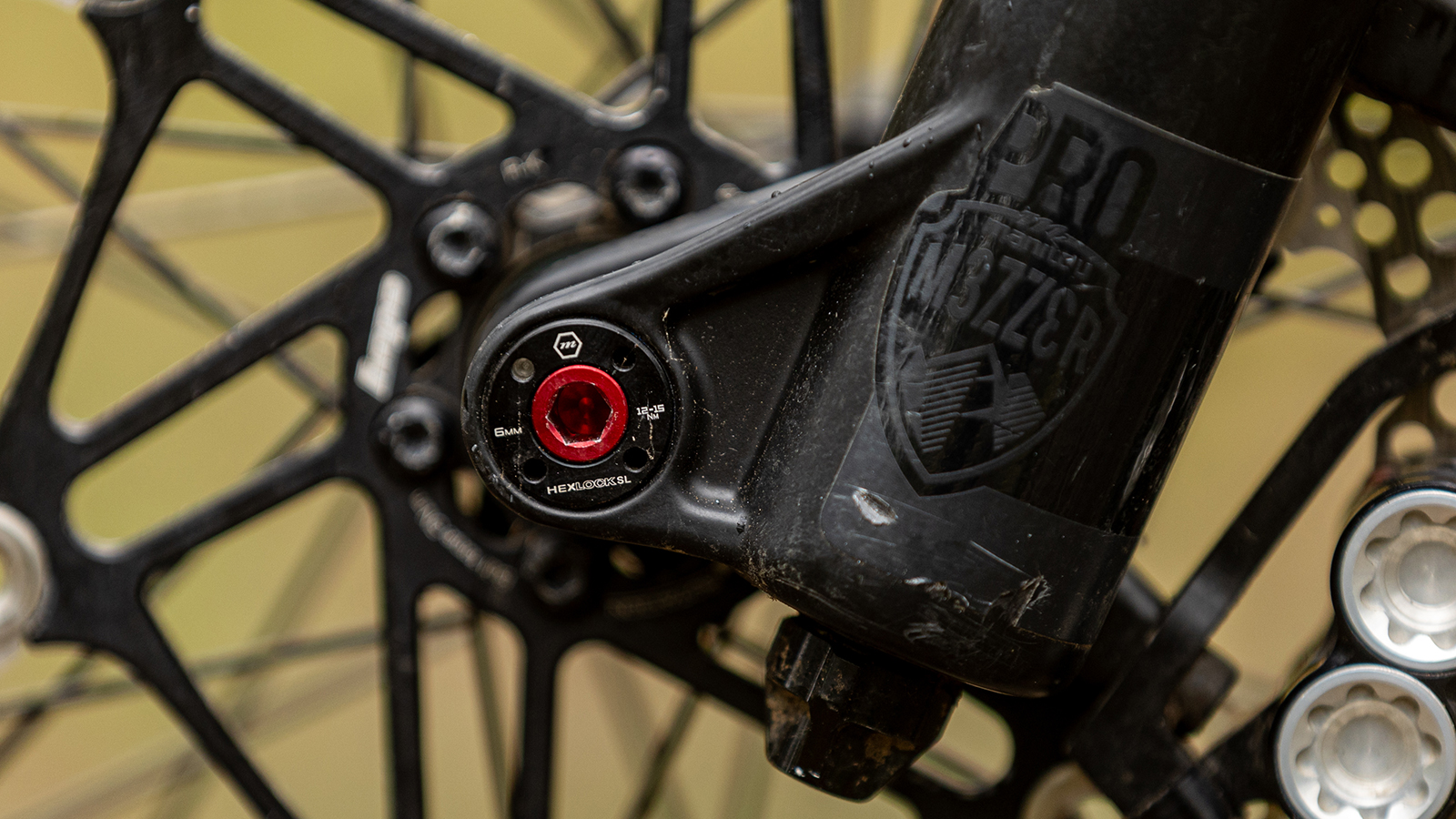
Where it also matches Charger 3 and Grip 2 is in the ability to move rapidly back and forth repeatedly at high shaft speeds as the front tire smashes through holes and hits. Manitou’s action is seamless and calm without any hiccups and no sense of different stages or zones throughout the stroke. It also tracks even deep holes and massive hits continuously and consistently on Alpine DH and enduro tracks that last over ten minutes without ever getting overworked.
Having such a refined and controlled action keeps the rider focused and steady and I could really lean into the front tire and trust the edge grip as much as any other fork I’ve tested. MC2 also seems to have the same touchdown quality of Grip 2 in absorbing small drops and steps at slower speeds. This means the front tire lands without any trembling or loss of traction by going ‘light’ on the ground momentarily – I find this quality essential to give you the confidence at steeper lean angles going off a drop or bigger roots whilst mid turn for example.
One other standout Mezzer trait is how it can soak up huge hits from landing in holes and deep compressions without ever getting flustered, destabilizing the bike or bouncing back at you. The air/damper combination just seems to resist bottoming out with minimal turbulence, whereas there can be occasional instances (on RockShox forks particularly) of a momentary flutter or ‘hiccup’ causing the tire to bounce back off the floor until the high-speed rebound circuit controls it – I simply didn’t ever have this sensation on the Mezzer.
Ultimately, what’s telling is the Mezzer stayed put, and I’ve had little inclination to service the Zeb and bung it back on. I wouldn’t claim this fork is outright better than a 38 or Zeb as both of those forks have advantages in some areas, but it’s a great package and with what’s going on with discounting at the moment, there are some absolutely killer deals kicking around. The US price at the minute makes it especially compelling and the Mezzer is lightweight and a brilliant choice for the rider that likes to delve a little deeper into setup, without being so tricky to dial in that the recommended settings won’t get you 90 percent of the way there.
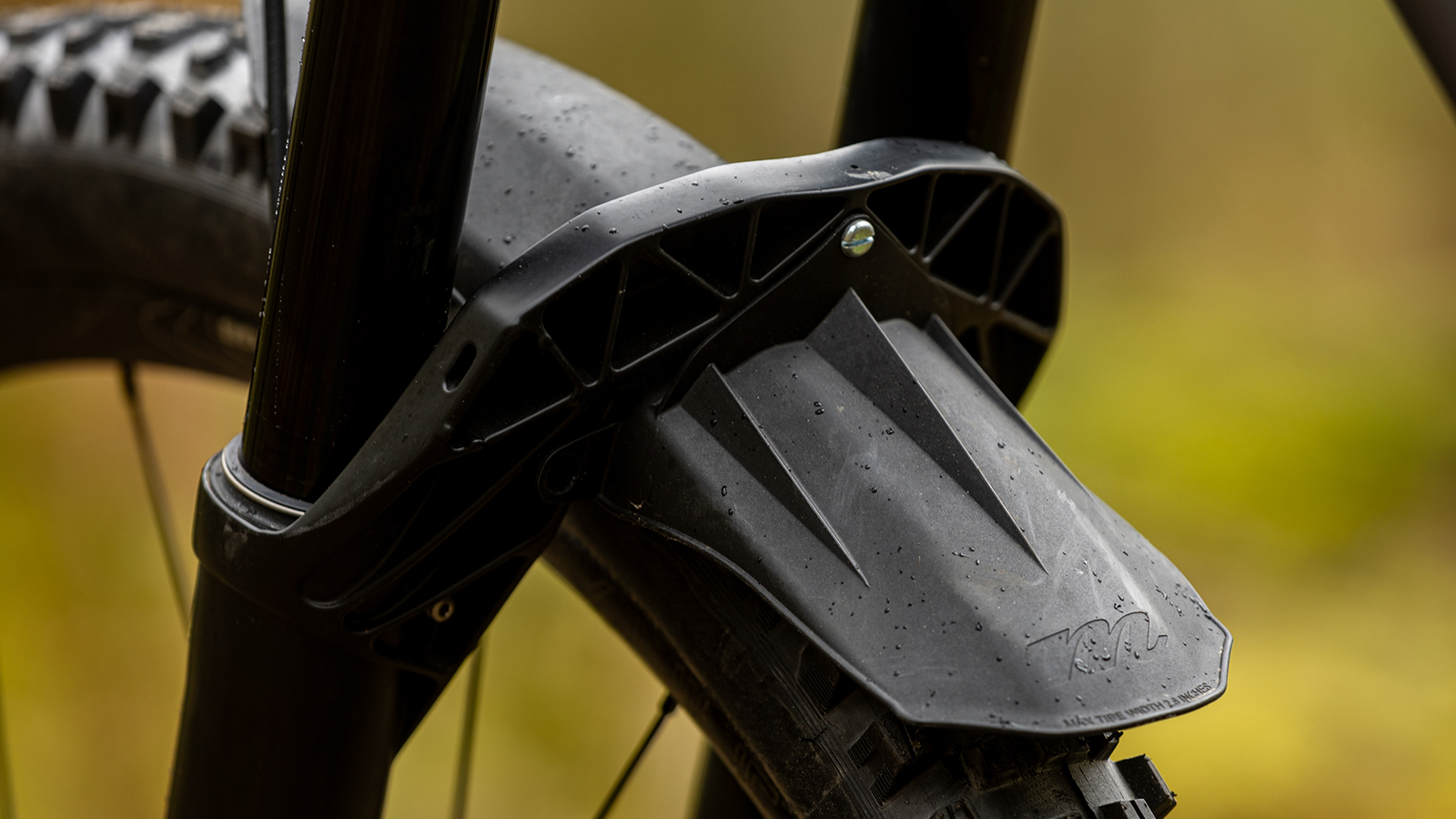
Verdict
Silky, ultra-controlled and assured, Manitou’s Mezzer is a smooth operator for any rider. The highly tuneable air spring can be perfectly set up if you pay it attention while setting the fork up and it also offers one extra trick it of being a chunk lighter than enduro models from the big two brands.
This means this adjustable travel fork might make a lot of sense for lighter riders after a burlier short travel fork who set it at 140 or 150mm. Equally, it's also a great option for lighter riders after a 180mm fork that isn’t as much of an unyielding, stiff or heavy unit as a Zeb or Fox 38.
Tech specs: Manitou Mezzer Pro
- Price: $659.99 / £1,100 / €683.99
- Components: One suspension fork with specific wheel size and offset. Included custom fender and travel adjust spacers
- Weight: 2,010g
- Size tested: 29in x 170mm travel, 44mm offset
- Rival products: Fox Float 36 and 38, RockShox Zeb and Lyrik, Öhlins RXF 38

An ex-elite downhill racer, Mick's been mucking about and occasionally racing mountain bikes for over twenty years. Racing led to photo modelling and testing kit for magazines back in the day, and, nowadays, he's mostly riding enduro-style terrain on conventional and electric bikes. As curious as ever about products and tech, he's as likely to be on the other side of the lens or computer screen rating, reviewing and shooting all the latest gear. Mick's list of regular clients includes Bike Perfect, MBR, MBUK, and most of the leading UK MTB publications at one point or another.
